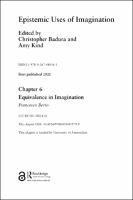Chapter 6 Equivalence in Imagination
Proposal review
Abstract
Ch. 6: One sense of imagination that matters in epistemology has the word mean reality-oriented mental simulation (ROMS): we suppose that something is the case, develop the supposition by importing background knowledge and beliefs, and check what is true in the imagined scenario. What is the logic of ROMS? Imagination has a reputation for being logically anarchic. In particular, it s hyperintensional: we can imagine A without imagining a necessarily equivalent B. This work considers a Principle of Equivalence in Imagination which, if accepted, will limit the anarchy: when A and B are equivalent in imagination, one will imagine the same things after supposing either in ROMS. What is equivalence in imagination? It is suggested that it s cognitive equivalence. A and B are cognitively equivalent for one when they play the same role in one s cognitive life: whatever one understands, concludes, etc., given either, one does, given the other. ROMS is logically modelled via variably strict modals. Two formal semantics are proposed for them: one uses possible worlds plus an algebra of topics; the other resorts to impossible worlds. The two deal with equivalence in imagination in subtly different ways.
Keywords
equivalence, imagination, reality-oriented mental, simulationDOI
10.4324/9781003041979–9ISBN
9781032018935, 9780367480561, 9781003041979Publisher
Taylor & FrancisPublisher website
https://taylorandfrancis.com/Publication date and place
2021Grantor
Imprint
RoutledgeClassification
Philosophy: epistemology and theory of knowledge
Philosophy of mind


 Download
Download